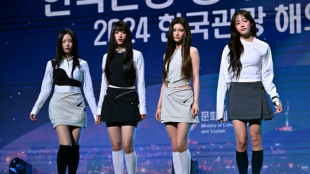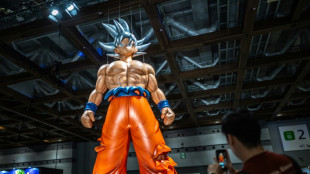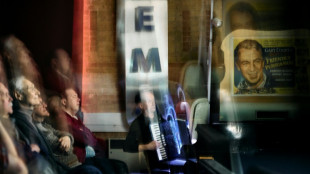
-
 New WHO financing mechanism put to the test
New WHO financing mechanism put to the test
-
Besigye kidnapping: Uganda president's doctor turned rival

-
 Star K-pop producer of NewJeans quits after legal spat with BTS agency
Star K-pop producer of NewJeans quits after legal spat with BTS agency
-
'Eternal' Nadal leaves legacy as he retires from tennis

-
 Vieira takes over at struggling Gerona
Vieira takes over at struggling Gerona
-
Australia's Kerevi banned for Morgan tackle

-
 Bellamy defies 'lunatic' reputation to inspire Wales revival
Bellamy defies 'lunatic' reputation to inspire Wales revival
-
Kremlin says US 'doing everything' to prolong 'war' in Ukraine

-
 Magritte painting nets auction record of $121 million
Magritte painting nets auction record of $121 million
-
Markets fluctuate as traders weigh geopolitical tensions

-
 N. Korea's latest weapon? Bombarding South with noise
N. Korea's latest weapon? Bombarding South with noise
-
'Kidnapped' Uganda opposition figure Besigye to appear at military court: lawyer

-
 Asian markets fluctuate as traders weigh geopolitical tensions
Asian markets fluctuate as traders weigh geopolitical tensions
-
'An inauspicious day': the landmines ruining Myanmar lives

-
 UN to vote again on Gaza ceasefire, US plans unclear
UN to vote again on Gaza ceasefire, US plans unclear
-
Japan's manga powerhouse 'Dragon Ball' turns 40

-
 Japanese, Koreans bottom of global love life survey
Japanese, Koreans bottom of global love life survey
-
Son blames 'mistakes' after South Korea held by Palestine in qualifier

-
 Japan ramps up tech ambitions with $65 bn for AI, chips
Japan ramps up tech ambitions with $65 bn for AI, chips
-
Lights, action, melodrama! Silent films get new reel at London haven

-
 Myanmar led world in landmine victims in 2023: monitor
Myanmar led world in landmine victims in 2023: monitor
-
ICC to sentence Timbuktu war criminal

-
 Ugandan opposition figure Besigye 'kidnapped', says wife
Ugandan opposition figure Besigye 'kidnapped', says wife
-
Australia's Jason Day eyes more major glory after resurgence

-
 Machu Picchu security boosted after visitors spread human ashes
Machu Picchu security boosted after visitors spread human ashes
-
Popovic hails Australia character in 'crazy' World Cup qualifier

-
 Taliban govt clearing 'un-Islamic' books from Afghanistan shelves
Taliban govt clearing 'un-Islamic' books from Afghanistan shelves
-
Argentina beat Peru as Uruguay hold Brazil

-
 Asian markets struggle as traders weigh geopolitical tensions
Asian markets struggle as traders weigh geopolitical tensions
-
Tatum stars as Celtics end Cavaliers unbeaten start

-
 Hurting India under pressure in blockbuster five-Test Australia series
Hurting India under pressure in blockbuster five-Test Australia series
-
'They killed her dream': Israel strike leaves woman footballer in coma

-
 Iraq holds its first census in nearly 40 years
Iraq holds its first census in nearly 40 years
-
Iraqis face tough homecoming a decade after IS rampage

-
 Russian net tightens around last civilians left in eastern Ukraine
Russian net tightens around last civilians left in eastern Ukraine
-
Olympic champion Tebogo aims to inspire next generation of African athletes

-
 Valencia on target as ten-man Ecuador upset Colombia
Valencia on target as ten-man Ecuador upset Colombia
-
'Rust' to premiere three years after on-set shooting

-
 Strike at French cognac maker Hennessy over measures in China spat
Strike at French cognac maker Hennessy over measures in China spat
-
Xi, Lula meet in Brasilia to 'enhance ties'

-
 SpaceX fails to repeat Starship booster catch, as Trump watches on
SpaceX fails to repeat Starship booster catch, as Trump watches on
-
'I have left a legacy': Nadal retires from tennis

-
 US recognizes Venezuela opposition's Gonzalez Urrutia as 'president-elect'
US recognizes Venezuela opposition's Gonzalez Urrutia as 'president-elect'
-
European powers, US seek to censure Iran at UN nuclear watchdog board

-
 UNAIDS chief says husband, Ugandan opposition figure Besigye, 'kidnapped'
UNAIDS chief says husband, Ugandan opposition figure Besigye, 'kidnapped'
-
Nadal's sensational career ends as Netherlands defeat Spain in Davis Cup

-
 US announces talks with Israel over civilian casualties in Gaza
US announces talks with Israel over civilian casualties in Gaza
-
SpaceX fails to repeat Starship booster catch, as Trump looks on

-
 G20 summit ends with Ukraine blame game
G20 summit ends with Ukraine blame game
-
Trump appoints TV celebrity 'Dr. Oz' to key US health post


Blinded in Bangladesh protests, students hope for better future
Bangladeshi student Omar Faruq believes the future of his country is bright but all he can see is darkness, after police trying to crush a student-led revolution blinded him with rubber pellets.
More than 450 people were killed -- many by police fire -- in the weeks of protests leading up to the ouster of ex-premier Sheikh Hasina, who fled to India on August 5 ending her 15-year autocratic rule.
But dozens of protesters were also robbed of their vision -- some in one eye, others entirely -- by the plastic or rubber grapeshot pellets police fired from shotguns.
Bangladeshi security forces are accused of having resorted to excessive force to quell the protests.
"I was bombarded with pellets all over... my nose, eyes, everywhere -- from close range," said 20-year-old Faruq.
He had hitchhiked 200 kilometres (125 miles) from the northern city of Bogura to attend the protests in the capital Dhaka.
Now he is getting treatment at the National Institute of Opthalmology and Hospital (NIOH), the country's biggest specialised eye centre.
Its records show nearly 600 people have lost at least some vision from shotgun pellets fired during the weeks of civil unrest against Hasina. Among those, 20 have been blinded completely.
Hundreds of others with pellet injuries in their eyes are undergoing treatment in smaller hospitals across Dhaka, according to local media reports.
"We were doing up to 10 surgeries at a time," said Mohammad Abdul Qadir, NIOH's acting director. "We have never seen such a situation before."
- 'Disproportionate force' -
Rights groups discourage the use of pellets for crowd control against unarmed protestors, calling the cluster clouds of shots indiscriminate.
US-based Physicians for Human Rights has called their use "inherently inaccurate", and potentially "lethal to humans at close range".
The United Nations last week said there were "strong indications" Bangladeshi security forces used "unnecessary and disproportionate force", with a team expected to visit Dhaka to investigate.
Those in the NIOH hospital, where ward after ward is filled with protesters with impaired vision, say they are witnesses to the violence.
Mohammad Abdul Alim, 34, lay writhing in pain in his bed at the hospital, several pellets still lodged in his body. His left eye was swollen and bloodshot.
"Sometimes I wish I could just cut off the left side of my face," said Alim, visibly anguished.
"I can't even properly see how much rice there is on my plate when I eat."
An X-ray image of Alim's skull seen by AFP bore testimony to his agony -- dozens of pelletslodged all over.
Alim said the police gave him and his fellow protesters 20 seconds to disperse before raining them with pellets.
He said scores of people "immediately collapsed" after the shots.
- 'Sacrifice for my country' -
Alim said he hoped the new authorities -- an interim administration led by Nobel laureate Muhammad Yunus -- would "take care" of his treatment.
Yunus's government said Tuesday it was setting up a foundation to "take care of the wounded and the families of the dead and wounded" who took part in the protests.
"We can never forget the contributions of the students and people who sacrificed their lives and who were grievously wounded while participating in the protests against the dictatorship," Yunus said in a statement.
He vowed his government would do "whatever is needed to take good care of the wounded and families of the deceased" as soon as it could.
But, for now, the injured have only their families to fall back on.
In another ward at NIOH, Nazrul Islam stroked the hair of his younger brother Rahmatullah Sardar Shabbir, trying to comfort him.
Doctors had managed to extricate two of the three pellets that pierced the 26-year-old's left eye on August 4 -- but failed to restore his vision.
"I cannot see anything with my left eye," said Shabbir, a law student.
But Shabbir -- and almost everyone else at NIOH who have lost their vision to pellets fired at them while participating in the protests -- said they had no regrets.
"It is a sacrifice for my country," he said, a Bangladeshi flag unfurled above his bed. "We have created a new Bangladesh."
A.Clark--AT
